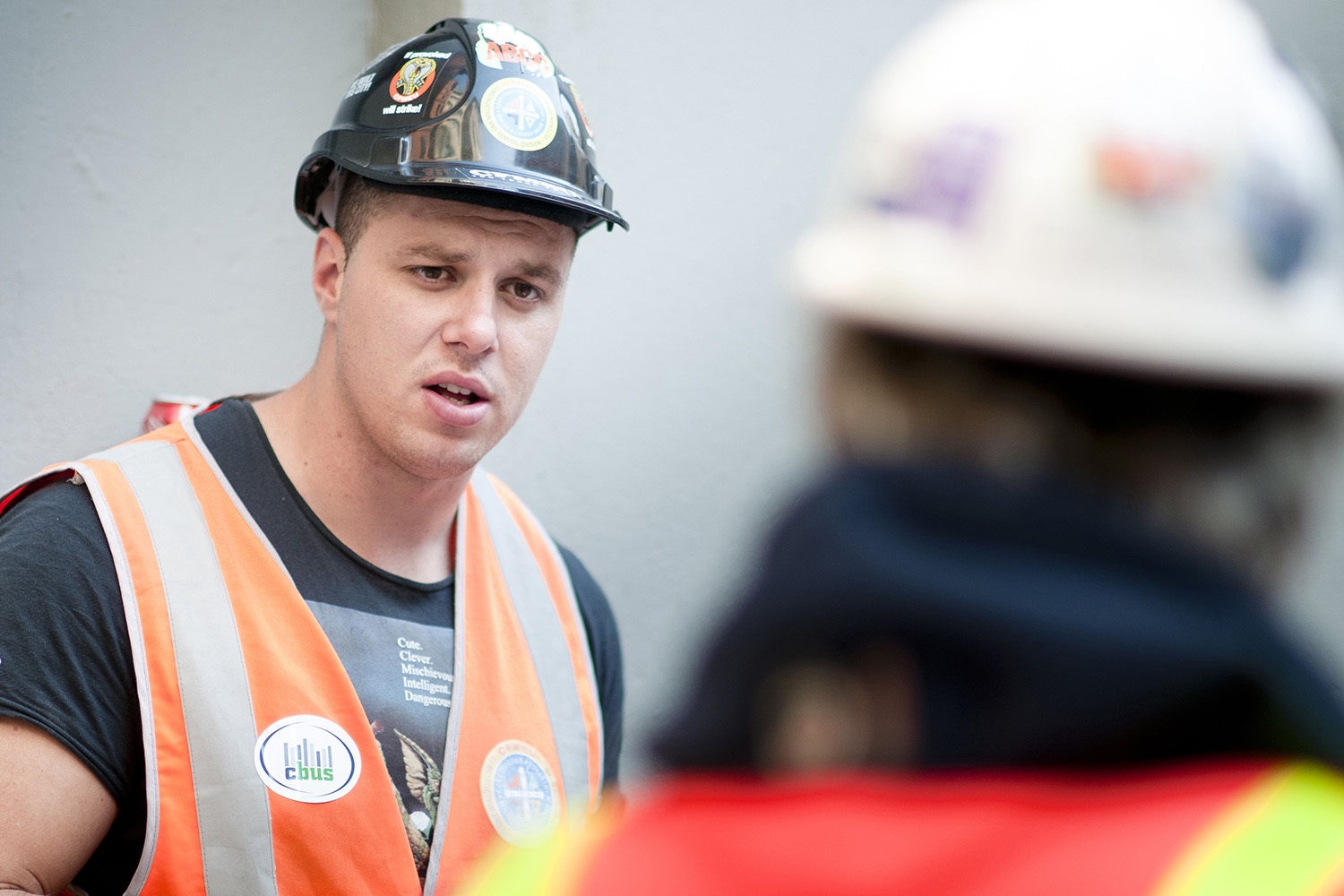Our further support page can help direct you to support services in your area.
The REconnect program has been designed in partnership with SuperFriend to offer tips and help our members through all stages of job loss.
Over six topics, we'll look at:
Maintaining health and wellbeing
Dealing with stress
Reconnecting with people around you
Living well on a budget
Access to support services
Topic 1 - Finding work: new places to look and where to start
Finding a job can really take it out of you! This topic will look at the hardest parts of finding a new job and how to get started.

First, there’s the searching. It can feel endless and frustrating, so it’s good to have some new places to look.
• Job sites you might not have tried yet (PDF)
Putting together a resume is also an important thing to do, Where do you start? What should you write on it? What shouldn’t you write?
• The tricks to writing a great resume (PDF)
And finally, the job interview. Getting an interview is a great thing, but then the nerves hit and it’s hard to know what to say.
To do list
Job search
Go through each of the job search websites we’ve listed and do some searches. Then make a shortlist of the ones you think are worth going back to each day.
Resume writing
Begin writing your resume with the easy bits, like listing down your qualifications and contact details. The detail can be finished later, but making a start is important.
Interview practice
Ask a friend to help you practise for an interview. Get them to ask some common questions and give it your best shot.
Topic 2 - It’s important to look after yourself
This topic looks at ways to maintain your health and wellbeing through what can be a really tough time.

This topic looks at ways to maintain your health and wellbeing through what can be a really tough time.
There are many reasons for job loss (it’s not personal), and lots of Australians are going through the same challenges. You’re definitely not alone.
We reckon the first step in getting through this is to take care of yourself. Yes, seriously! Letting your health go is the last thing you need right now, so it’s important to build ways to look out for number one.
So, why not take a look at the three articles below to keep on top of your game.
• How to practice self care (PDF)
• Routines that will help you out of a slump (PDF)
• How to get a good night's sleep (PDF)
If you’re struggling to find the time or motivation to do the things that help your health and your mind, remember it doesn’t have to be hard – even little bits of time doing the things you enjoy can make a big difference.
To do list
treat yourself
Set aside half an hour of your day to do something you really enjoy. Go for a walk, read a book or have a chat with a mate.
Plan your day
Write a plan for how you’ll spend your day tomorrow. List things under: looking for work, personal development, social outings and family, fun and exercising.
Ensure you sleep well
Do some things today that are going to help you sleep like a baby tonight. Get outside, do something active, and eat foods that are good for you.
Topic 3 - How to deal with stress before it gets you down
Feel like you’re carrying the weight of the world on your shoulders? In this topic, we’re tackling stress – and we hope you will too.

Stress hits everyone, and it’s normal to feel like things are getting too much when work has dried up. It’s important, though, not to let that stress get out of control and take over your life.
The good news is there are lots of ways you can deal with those worries, and focus on moving towards better times. Yes, it’s time to take charge against the stress and make a fresh start.
• How to make a fresh start (PDF)
Like anything, stress is best dealt with early, to make sure it doesn’t keep getting worse. A positive approach to dealing with it means taking some action and solving the problems you’re having.
• Dealing with stress before it gets you down (PDF)
That can be easier said than done, and you might need to ask friends to help you do some problem solving. It’s true what they say: a problem shared is definitely a problem halved.
• The skills you need to solve any problem (PDF)
To do list
Review
Review your plans from the last topic (self care). Set some goals that help you look after yourself and take some small steps towards achieving them.
Start
Think of one thing that’s adding extra stress into your life and start dealing with it. Can you get rid of it? Or can you enlist some help to manage it.
Pause
Hit the pause button: One place to get started is Smiling mind, a not for profit organisation dedicated to assisting people in dealing with the pressure, stress and challenges of daily life.
Topic 4 - Connect with others to help you through
For this topic, your challenge is to find your tribe: the people who you want to be around.

Some people find it hard to get together with friends when they’re feeling down, and talking about job loss with friends and family might feel strange. But those people can offer a lot through this tough time – whether you need help with job searching or just a friendly ear.
• Get by with a little help from your friends (PDF)
You can also find support by being around people you don’t know yet. You might want to join a networking group, a sports team or a community group to fill in some time and have some fun.
Networking and surrounding yourself with others, whether you know them or not, might even help you find work.
• The strength of networking (PDF)
All of these steps can help you get to know yourself outside work, too. You can use this time to figure out what you want to do, find some different things you enjoy, and get into a new routine.
• Get to know yourself outside of work (PDF)
Getting social is the one thing guaranteed to help lift those spirits. After all, that’s what friends are for.
To do list
Reach out
Is there a friend or family member you can reach out to? Call them up and organise a get together this week, maybe just for a chat or doing something you both find fun.
Try something new
Try out a new hobby. Whether it’s sport, volunteering with a local group or something completely different, now’s the time to try something new.
Keep your skills
Do you know anyone that could put your skills to good use? Perhaps you could mentor someone or find someone that can mentor you learning a new skill?
Topic 5 - How to get by without a pay packet
Having no money coming in can be extremely stressful. In fact, money is one the biggest causes of stress around the country so you’re definitely not alone in feeling this way.

This week we’re looking at getting by without a pay packet, which might be more possible than you think.
• How to get by without a pay packet (PDF)
The first step is to put together a budget, where you can look at what bills are coming out and the money that’s coming in. And if you’ve been paid out a redundancy or long service leave entitlement, keep it aside in case it takes longer than you expect to find work. You might need that cash for paying your way in the meantime.
One of your biggest expenses is food, so the next thing to do is work out how to eat on the cheap. It can be more delicious than you expect, if you take the time to do some planning.
• Budget recipe ideas you'll love (PDF)
It’s also important to continue to have some fun! Try thinking outside the square about how you can still get out with friends while you’re on a tight budget. Remember, sometimes the best things in life really are free.
• How to go out when you're on a tight budget (PDF)
To do list
Draft a budget
Draft a budget. Not sure where to start? The free MoneySmart calculator guides you through the process.
Budget cooking
Try out a new, budget-friendly recipe that uses up some of the ingredients you already have in the pantry.
Find free activities
Have an outing that’s free and easy. You might want to get out for a run or invite friends to the local park for a barbeque.
Topic 6 - Places you can turn to for extra support.
When you’re struggling, it can seem like there’s no one who can help. The good news is, whether you need a shoulder to lean on or some financial advice, there are supports on offer to help you through a rough time.

It’s really important to get your head around the support services that are available to you. They include:
- Your bank: talk about options for how you can meet mortgage payments and pay the bills
- The Department of Human Services (formerly Centrelink): find out if you can access some income support
- Talking to a financial counsellor: financial counsellors are qualified professionals who provide a free, confidential and independent support and advocacy service for people experiencing financial difficulty
• What support services are available to you (PDF)
One way to lift your spirits can be through registering to volunteer with a community group, which may also provide opportunity for you build new skills.
• Volunteering with a charity or community group (PDF)
Doing a course or shadowing a mate to get the skills you’ll need for your next job can also be useful ways to grow your skill set
• How to develop the skills you really need (PDF)
To do list
Brainstorm
Brainstorm your support options. Grab a pen and paper and write down which support services could help you right now, and the questions you want to ask them.
Volunteer
Look into volunteering. Go to a local group and ask about volunteering options – find out as much as you can and give it a try before committing long-term.
New skills
Think of a new skill you could use. If there’s something that could help you get a new job, research short courses or ask a friend to be your mentor.
Be sure to check out our further support page.
Cbus, in partnership with SuperFriend, has engaged the Australian Psychological Society (APS) to provide information for the REconnect program for Cbus members. The information is intended for educational and information purposes only. It cannot take the place of any professional medical help, diagnosis or treatment. If you are in crisis, please call Lifeline on 13 11 14. Cbus’ Trustee: United Super Pty Ltd ABN 46 006 261 623 AFSL 233792 Cbus ABN 75 493 363 262